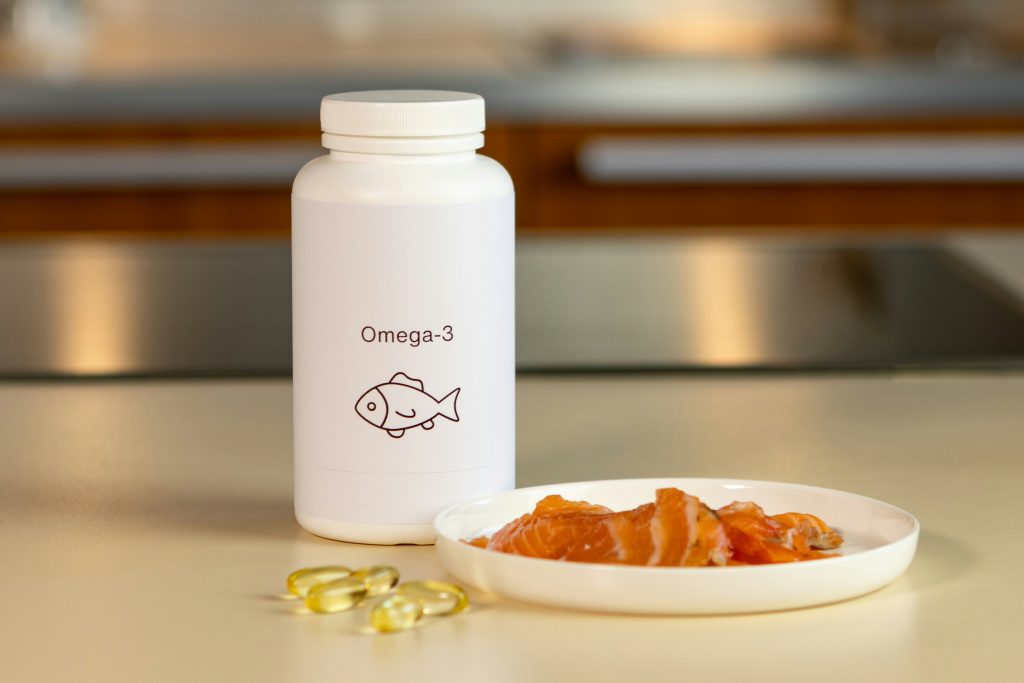The Irish legend of An Bradán Feasa (the Salmon of Data) tells of a salmon which ate the nuts from a legendary hazel tree and gained all of the knowledge of the world. A younger man named Fionn Mac Cumhaill caught the fish and burnt his thumb as he was cooking it. Sucking his fingers to ease the ache, all of the information of the world was handed onto him, and he turned certainly one of Eire’s most prolific warriors.
In a extra fashionable context, there was rising curiosity within the relationship between omega-3s fatty acids, that are present in oily fish and dietary supplements, and their potential health-boosting results. Relating to psychiatry, the function of omega-3s in despair has been mentioned in a number of earlier Psychological Elf blogs (Wessa, C., 2024; Clarke, G., 2023; Crick, D. 2023).
We now know that omega-3s have necessary roles within the mind, corresponding to sustaining the integrity of nerve cell membranes, selling formation of synapses (connections) between nerve cells, and lowering irritation (Hsu et al, 2020).
Psychotic issues corresponding to schizophrenia are regarded as characterised by extreme pruning of synapses and elevated irritation within the mind (Howes et al, 2023). So, might omega-3 supplementation be used to stop the onset of psychosis in folks at excessive threat?
An preliminary trial (Amminger et al, 2010) recruited individuals who met standards for being at “ultra-high threat” of psychosis (see Yung A & Nelson B, 2013 for extra particulars on the ultra-high threat idea). On this trial, members randomised to obtain day by day omega-3 dietary supplements had a decrease threat of subsequently creating psychosis in comparison with those that acquired a placebo capsule.
Nonetheless, two subsequent comparable trials evaluating omega-3 dietary supplements to placebo discovered no proof for a useful impact of omega-3s in lowering psychosis threat (McGorry et al, 2017; Qurashi et al, 2024). So, extra analysis is required to supply a clearer image.
The authors of the paper that’s the topic of this weblog (Winter-van Rossum et al, 2024) carried out a randomised managed trial in folks at ultra-high threat of psychosis to see whether or not omega-3 supplementation for six months decreased the danger of creating psychosis in comparison with placebo.

May omega-3 supplementation be used to stop the onset of psychosis in folks at excessive threat?
Strategies
The authors carried out a randomised managed trial of individuals at ultra-high threat of psychosis, aged between 13 and 20 years, recruited from a number of websites throughout Europe and Israel.
Individuals accomplished an interview known as the Complete Evaluation of At-Threat Psychological States and have been eligible for inclusion in the event that they met established standards for being at “extremely excessive threat” of psychosis (Yung & Nelson, 2013).
People have been excluded if they’d a present or previous prognosis of a schizophrenia-spectrum dysfunction; they have been taking an antipsychotic within the earlier 6 months or a temper stabiliser within the earlier 2 weeks; or had taken an omega-3 complement for greater than 4 weeks throughout the final 6 months.
Eligible members have been then randomly allotted to take both a day by day dose of omega-3s (within the type of a capsule), or a placebo of comparable measurement, form and style, for the following 6 months. Neither the researchers nor the members knew in the event that they have been allotted the remedy or the placebo (double-blind).
The researchers adopted up the members on a number of events over the next 2 years. At these visits the members accomplished interviews to evaluate if they’d developed psychosis, which was the first final result of the research. Cox regression evaluation was used to match the transition charge between the 2 teams.
As well as, the researchers checked out a couple of secondary outcomes, together with scores for severity of psychotic signs, despair signs, manic signs and international functioning. In addition they recorded any severe adversarial occasions in each teams.
Outcomes
In whole, the researchers assessed 158 folks for inclusion within the research and 146 have been randomised. After exclusions, there have been 67 folks within the omega-3 remedy group and 68 within the placebo management group. The teams have been balanced on age, intercourse, ethnicity, IQ and symptom scores.
Within the omega-3 group, 5 of 67 (7.5%) developed psychosis over the 2-year follow-up interval. This in comparison with 3 of 68 (4.4%) within the placebo group. It’s price noting right here that, resulting from dropout, the end result evaluation was solely out there for 46 folks within the omega-3 group and 46 folks within the placebo group.
The Cox regression evaluation confirmed that the speed of transition to psychosis didn’t considerably differ between the 2 teams (HR 1.67, 95% CI: 0.40 to six.98, P-value = 0.5).
For the secondary outcomes, there have been no variations within the change in signs of psychosis, despair, mania or functioning between the 2 teams.
Fortunately, there was solely a small variety of adversarial occasions in each teams. There have been solely 4 occasions reported in 5% or extra of members, together with widespread chilly, influenza, nausea, and suicidal ideation. In whole, there have been 19 adversarial occasions within the omega-3 group, and 18 adversarial occasions within the placebo group.

The speed of transition to psychosis was comparable between the 2 teams however pattern sizes have been small.
Conclusions
This trial is the third to point out that, in comparison with placebo, omega-3 supplementation has no impact on the danger of creating psychosis amongst ultra-high threat people. The researchers additionally discovered no influence of omega-3s on symptom severity. They conclude:
The cumulative proof from 3 worldwide, large-scale research demonstrating a scarcity of any protecting results of omega-3 on the transition to psychosis argues towards future research on this line of analysis and doesn’t assist its promotion as a preventive remedy possibility in UHR states for psychosis.

This trial is the third to point out that, in comparison with placebo, omega-3 supplementation has no impact on the danger of creating psychosis amongst ultra-high threat people.
Strengths and limitations
This was a well-conducted randomised managed trial from an skilled group of researchers. Individuals have been recruited throughout quite a lot of worldwide websites, which helps to extend generalisability and reduces the danger of bias in comparison with single-site research.
Individuals have been randomly allotted to the omega-3 remedy or placebo management. Each the members and the researchers didn’t know which group the participant was allotted to. Efforts have been made to make sure the placebo capsule resembled the omega-3 capsule as carefully as doable, to scale back the danger that members would possibly inadvertently uncover which capsule they’d acquired (e.g. due to the style), as this might bias the outcomes.
One other power was that the researchers analysed blood samples from the members to measure the quantity of omega-3 of their blood. The omega-3 group confirmed a major enhance in omega-3 ranges of their blood checks from the beginning of the research to the top of their remedy, which wasn’t the case within the placebo group, suggesting that these randomised to omega-3 remedy did actually take it. Nonetheless, it’s price noting that these have been group-level analyses, so it stays unsure how particular person adjustments in omega-3 ranges associated to threat of psychosis.
As with all research, there have been additionally some limitations. 29 folks dropped out of the research within the 6-month remedy part (e.g. they developed psychosis already, or they have been misplaced to follow-up). Knowledge for the ultimate final result evaluation have been solely out there for 46 folks within the omega-3 group and 46 folks within the placebo group. Which means that the outcomes won’t be consultant of the enrolled group, as a result of we don’t know what the outcomes have been for the individuals who dropped out of the research.
The authors carried out a pattern measurement calculation which confirmed they wanted 220 folks within the research to have enough statistical energy to detect vital results of the intervention on the end result. Sadly, the trial needed to be stopped early resulting from difficulties with recruitment and enrolment because of the Covid-19 pandemic. After all, this was outdoors the authors’ management, however however decreased the facility of the statistical analyses and meant they may not recruit the variety of members wanted per their calculations.

This research was nicely carried out, making use of quite a few measures to scale back bias and enhance generalisability of the findings.
Implications for apply
What does this research add to our present information? Thus far, of 4 trials of omega-3 dietary supplements in ultra-high threat teams, one research has discovered a useful impact in lowering the danger of transition to psychosis whereas 3 research haven’t. The authors counsel that, collectively, these findings don’t assist additional analysis on this specific query. Nonetheless, it’s price unpacking a couple of points.
The authors themselves present a couple of causes for his or her unfavorable findings. For instance, a number of research have discovered that the speed of transition to psychosis in ultra-high threat samples has been falling over time (Hartmann et al, 2016). One cause for this could possibly be enhancements within the non-pharmacological remedies corresponding to counselling and psychological therapies. If these remedies are extremely efficient in lowering the transition charge, then it may be very tough to point out any enchancment of different interventions (like omega-3s) over and above the results of those different remedies.
Moreover, in comparison with the newer trials, the preliminary research that reported a useful impact had fewer members on antidepressant medicine, and used a barely completely different final result definition (Amminger et al, 2010). So, the teams and the findings is probably not instantly comparable.
Does this imply it’s time to abandon all analysis on omega-3s in relation to prevention of psychosis? That could be throwing the infant out with the tub water (or presumably the salmon with the river water).
Given the largely unfavorable outcomes from the randomised managed trials carried out to this point, it’s exhausting to argue for extra analysis in extremely high-risk teams particularly. Certainly, there are broader issues in regards to the ultra-high threat paradigm: it requires specialist clinics that merely aren’t out there in most locations; entails intensive scientific interviews that want specialist coaching to manage; and even when such clinics are in place, most individuals with first episode psychosis don’t come by means of these companies anyway (Ajnakina et al, 2019). So, possibly we have to have a look at defining different high-risk teams wherein to look at the effectiveness of omega-3s for psychosis prevention.
It’s additionally the case that the interventions utilized in these research won’t be optimum. Omega-3 dietary supplements can oxidise and degrade over time (Cameron-Smith et al, 2015). It could be that, slightly than a capsule, we must always have a look at dietary interventions the place omega-3 consumption is augmented by bettering pure dietary sources of omega-3s.
Lastly, ready till the late teenage years (as is the case within the extremely high-risk group) would possibly merely be too late. In schizophrenia, it’s thought that there’s extreme pruning of those connections at an early developmental stage (Howes & Onwordi, 2023). One of many most important methods omega-3s are thought to assist in mind improvement is by selling connections between mind cells. Apparently, my colleagues and I just lately discovered that younger folks with low blood ranges of omega-3s throughout childhood, adolescence and early maturity skilled extra signs of psychosis at age 24 in comparison with these whose ranges of omega-3s stayed round common (Mongan et al, 2024).
May intervening with omega-3s (both by means of food plan or supplementation) in early childhood result in decreased threat of psychosis in later life? We don’t know but – however that’s precisely why we have to do extra analysis. This research suggests the reply could not lie within the extremely high-risk group. However it might lie in utilizing different interventions, defining different high-risk teams (for instance focusing on individuals who have already got low omega-3 ranges), and even aiming broader by rising omega-3s at inhabitants degree. Till we catch the salmon of information, we have to depend on extra analysis!

Till we catch the salmon of information, we have to depend on extra analysis to raised perceive whether or not/how omega-3s can be utilized to scale back psychosis threat.
Assertion of pursuits
David has revealed two papers inspecting omega-3 ranges in relation to psychosis threat (as under) however he had no function within the at present mentioned paper.
Mongan D, Perry BI, Healy C et al. Longitudinal Trajectories of Plasma Polyunsaturated Fatty Acids and Associations With Psychosis Spectrum Outcomes in Early Maturity. Biol Psychiatry. 2024 Nov 15;96(10):772-781. doi: 10.1016/j.biopsych.2024.04.004.
Mongan D, Healy C, Jones HJ et al. Plasma polyunsaturated fatty acids and psychological issues in adolescence and early maturity: cross-sectional and longitudinal associations in a basic inhabitants cohort. Transl Psychiatry. 2021 Might 31;11(1):321. doi: 10.1038/s41398-021-01425-4.
Hyperlinks
Main paper
Winter-van Rossum I, Slot M, van Hell H et al. (2024)Effectiveness of Omega-3 Fatty Acids Versus Placebo in Topics at Extremely-Excessive Threat for Psychosis: The PURPOSE Randomized Scientific Trial. Schizophr Bull. 2024 Oct 25:sbae186. https://doi.org/10.1093/schbul/sbae186
Different references
Ajnakina O, David AS, Murray RM. ‘In danger psychological state’ clinics for psychosis – an concept whose time has come – and gone! Psychol Med. 2019 Mar;49(4):529-534. doi: 10.1017/S0033291718003859.
Amminger GP, Schäfer M, Papageorgiou Ok, et al. Lengthy-chain omega-3 fatty acids for indicated prevention of psychotic issues. Arch Gen Psychiatry. 2010;67:146–154.
Cameron-Smith D, Albert BB, Cutfield WS. Fishing for solutions: is oxidation of fish oil dietary supplements an issue? J Nutr Sci. 2015 Nov 23;4:e36. doi: 10.1017/jns.2015.26
Clarke, G. Intestine microbiome disruptions in despair: shifting the main focus to metabolic signatures in blood. The Psychological Elf. 2023
Crick, D. Does what you eat have an effect on how you’re feeling? The Psychological Elf. 2023
Hartmann JA, Yuen HP, McGorry PD, et al. Declining transition charges to psychotic dysfunction in “ultra-high threat” purchasers: Investigation of a dilution impact. Schizophr Res. 2016;170:130–136.
Howes OD, Onwordi EC. The synaptic speculation of schizophrenia model III: a grasp mechanism. Mol Psychiatry. 2023 Might;28(5):1843-1856. doi: 10.1038/s41380-023-02043-w.
Hsu M-C, Huang Y-S, Ouyang W-C. Useful results of omega-3 fatty acid supplementation in schizophrenia: doable mechanisms. Lipids Well being Dis. 2020 Jul 3;19:159. doi: 10.1186/s12944-020-01337-0
McGorry PD, Nelson B, Markulev C, et al. Impact of omega-3 polyunsaturated fatty acids in younger folks at ultrahigh threat for psychotic issues: the NEURAPRO randomized scientific trial. JAMA Psychiatry. 2017;74:19–27.
Mongan D, Perry BI, Healy C et al. Longitudinal Trajectories of Plasma Polyunsaturated Fatty Acids and Associations With Psychosis Spectrum Outcomes in Early Maturity. Biol Psychiatry. 2024 Nov 15;96(10):772-781. doi: 10.1016/j.biopsych.2024.04.004.
Qurashi I, Chaudhry IB, Khoso AB, et al. A randomised double-blind placebo-controlled trial of minocycline and/or omega-3 fatty acids added to remedy as common for in danger Psychological States: The NAYAB research. Mind Behav Immun. 2024;115:609–616.
Wessa, C. Anti-inflammatory remedies for youth despair: promising however not but implementable. The Psychological Elf. 2024.
Yung A, Nelson B. The ultra-high threat concept-a assessment. Can J Psychiatry. 2013 Jan;58(1):5-12. doi: 10.1177/070674371305800103.








